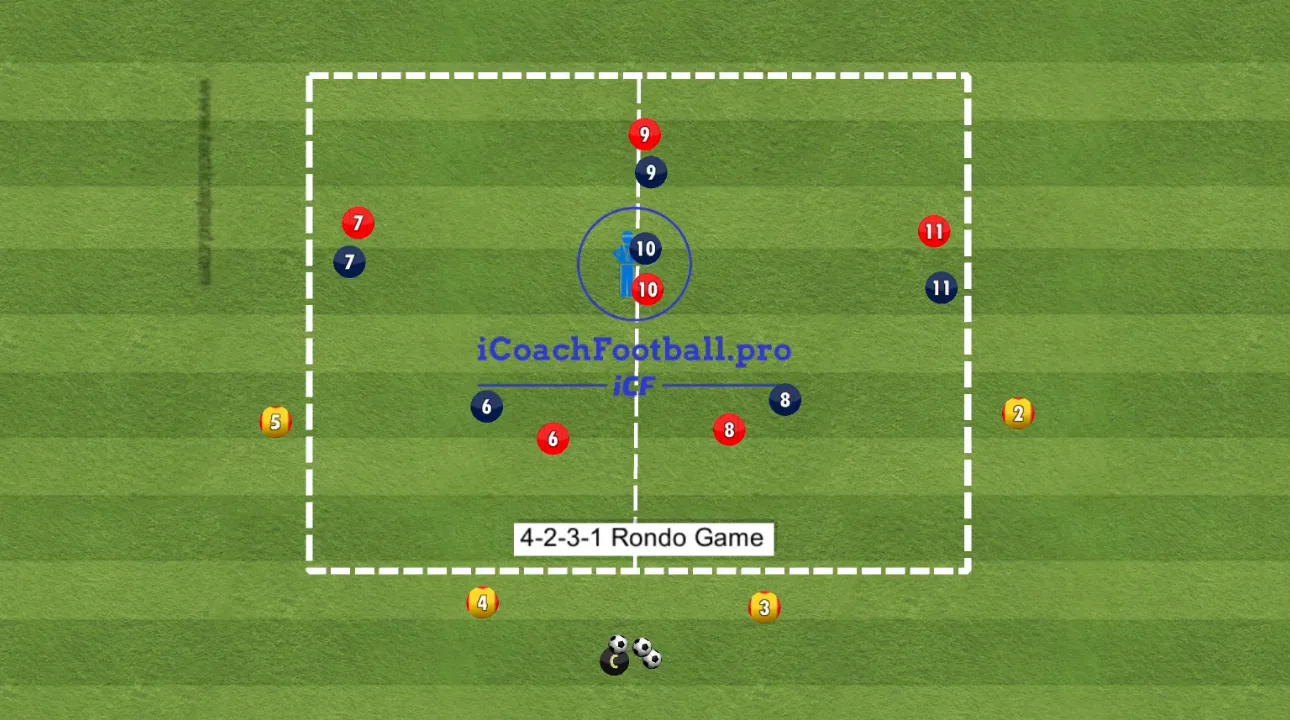In the world of soccer, tactical formations play a crucial role in determining the flow and success of a team’s gameplay. One such formation that has gained popularity in recent years is the 4-2-3-1 formation. This formation provides a solid foundation for both defensive stability and attacking prowess, allowing teams to control the game effectively.
However, what sets this formation apart is the concept of incorporating Rondo games within the team’s training sessions. Rondo games, also known as piggy in the middle or keep-away, are small-sided games that focus on maintaining possession and improving players’ technical skills.
In a 4-2-3-1 tactical Rondo, the team is divided into two boxes, with each box consisting of six players against four opponents. This setup allows for intense and challenging training sessions that enhance players’ decision-making abilities, passing accuracy, and overall game understanding.
The Benefits of Tactical Rondo in a 4-2-3-1 Formation
1. Improved Decision Making: The fast-paced nature of Rondo games forces players to make quick decisions under pressure. By incorporating Rondo into the 4-2-3-1 formation, players in the attacking midfield positions (number 10 and wingers) can improve their decision-making skills, such as when to pass, dribble, or shoot.
2. Passing Accuracy: The 4-2-3-1 formation places a strong emphasis on quick, accurate passing. By incorporating Rondo games within this formation, players can fine-tune their passing abilities, ensuring that they can maintain possession and create scoring opportunities effectively.
3. Game Understanding: Rondo games in the 4-2-3-1 formation help players develop a better understanding of their roles and responsibilities within the team. The compact nature of the game allows players to experience the positional demands of their respective positions, improving their overall game understanding.
More info about 4-2-3-1 formation: Tactics: How to play in 4-2-3-1? Our complete guide with exercises.
Implementing the Tactical Rondo Game in Training Ground
When implementing the tactical Rondo in a 4-2-3-1 formation, coaches should consider the following key points:
1. Box Setup: Divide the team into two boxes, with six players in each box. The objective is for the team in possession to maintain possession while the team out of possession tries to win the ball back. This setup allows for intense and competitive training sessions.
2. Focus on Positional Roles: During the Rondo games, emphasize the specific roles and responsibilities of each position within the 4-2-3-1 formation. This will help players understand the importance of their positioning and movement in relation to their teammates.
3. Vary the Intensity: Adjust the intensity of the Rondo games based on the team’s needs and objectives. Start with a slower pace to allow players to understand the movements and progress to a higher intensity to simulate game-like situations.
4. Encourage Communication: Communication is key in the 4-2-3-1 formation, and the Rondo games provide an excellent platform for players to develop their communication skills. Encourage players to communicate effectively, both verbally and non-verbally, to maintain possession and create scoring opportunities.
Full drill in the video below: 4-2-3-1 | Rondo Idea
More Rondo Drills: Transition Rondo Drills | Game Situations, Possession, Transitions, and Finishing
The 4-2-3-1 formation combined with tactical Rondo games offers a comprehensive training approach that enhances players’ technical skills, decision-making abilities, and overall game understanding.

Thank you, Great drill. Keep Posting 🙂